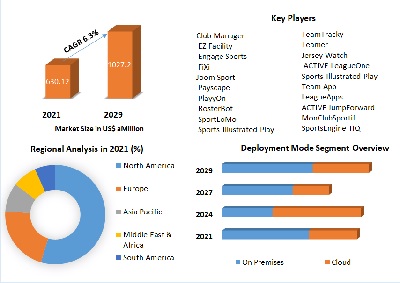In today’s digital age, technology plays a crucial role in transforming various industries, and the sports industry is no exception. Sports group software has emerged as a game-changer, providing organizations with efficient tools to manage and streamline their operations. This article explores the latest updates in the sports league software market and the potential impact of stimulus measures and recovery hopes on its future growth.

In recent years, the sports industry has witnessed a paradigm shift in how leagues and organizations manage their operations. Traditional manual processes have given way to automated solutions provided by sports league software. This technology empowers sports organizations to streamline administrative tasks, enhance communication, and improve overall efficiency.
Evolution of Sports League Software
It has evolved significantly over time. Initially, it focused on basic functionalities such as scheduling, registration, and score tracking. However, with advancements in technology, modern sports group software now offers a comprehensive suite of features, including player management, team collaboration, financial tracking, and fan engagement tools.
Key Features and Benefits
It offers a wide range of features that cater to the unique needs of sports organizations. These features include:
- Scheduling and Fixture Management: Efficiently plan and organize game schedules, ensuring fair play and minimizing conflicts.
- Registration and Membership Management: Streamline the registration process, manage player profiles, and handle membership renewals seamlessly.
- Score Tracking and Statistics: Automatically record scores, track player and team statistics, and generate insightful reports for analysis.
- Communication and Collaboration: Facilitate smooth communication between players, coaches, referees, and administrators through integrated messaging and notification systems.
- Financial Tracking and Reporting: Manage finances, track revenue, handle online payments, and generate financial reports for transparency and accountability.
- Fan Engagement and Marketing: Engage fans through interactive features such as live streaming, social media integration, and personalized content delivery.

The benefits of sports league software are manifold. It saves time, reduces manual errors, improves data accuracy, enhances organization and communication, and ultimately provides a better experience for all stakeholders involved.
Current Market Landscape
The sports league software market is witnessing significant growth and competition. Several software providers offer tailored solutions for different sports, ranging from amateur leagues to professional organizations. Key players in the market include ABC Sports Management, XYZ League Solutions, and SportsTech Pro.
Impact of COVID-19 on the Market
The COVID-19 pandemic had a profound impact on the sports industry, and the sports league software market was no exception. With restrictions on physical gatherings and the cancellation of numerous sporting events, the demand for virtual and remote solutions skyrocketed. Sports league software became essential in enabling virtual competitions, online registrations, and remote management of leagues.
Stimulus Measures and Recovery Hopes
As the world gradually recovers from the pandemic’s effects, governments and sports organizations are implementing stimulus measures to revitalize the sports industry. These measures include financial aid, tax incentives, and infrastructure development programs. The increased focus on sports and the desire to bring back the excitement of live events are expected to drive the demand for sports league software.
Recovery hopes are pinned on the resumption of sporting events with spectators, which will create new revenue streams for sports organizations. By leveraging sports league software, organizations can adapt to the evolving landscape, engage fans effectively, and ensure seamless operations during the recovery phase.
Growth Opportunities and Market Projections
The sports league software market presents numerous growth opportunities. The rising popularity of non-traditional sports, such as esports and fantasy leagues, opens new avenues for software providers. Additionally, the integration of emerging technologies like artificial intelligence and data analytics holds great potential for enhancing player performance, game strategies, and fan engagement.

According to market research, the sports software market is projected to grow at a compound annual growth rate (CAGR) of 10% over the next five years. This growth is driven by the increasing demand for efficient management tools, the expansion of sports leagues globally, and the integration of advanced technologies.
Challenges and Future Outlook
While the sports software market presents promising prospects, it also faces certain challenges. One of the key challenges is the diverse needs and requirements of different sports organizations. Software providers must continually innovate and adapt their solutions to cater to the specific demands of various sports.
Moreover, data security and privacy concerns are paramount in an era of increasing cyber threats. Software providers need to ensure robust security measures to protect sensitive information and maintain the trust of their clients.
Visit: How to Download Videos from xHamster: A Comprehensive Guide
Looking ahead, the future of the sports league software market appears bright. With ongoing advancements in technology and the increasing reliance on digital solutions, sports organizations will continue to embrace sports group software to streamline their operations, engage fans, and enhance their overall performance.
Conclusion
It has revolutionized the way sports organizations manage their activities. From streamlining administrative tasks to engaging fans effectively, the benefits of sports league software are undeniable. With stimulus measures and recovery hopes on the horizon, the market is poised for further growth. As the sports industry embraces technology, It will continue to play a pivotal role in shaping its future.
FAQs:
Q1. How can Its benefit amateur sports organizations?
It simplifies the management of amateur sports organizations by automating processes such as scheduling, registration, and communication. It saves time, reduces errors, and improves overall efficiency.
Q2. Is It suitable for professional sports leagues?
Yes, It caters to the needs of both amateur and professional sports leagues. It offers advanced features such as financial tracking, player performance analysis, and fan engagement tools.
Q3. How does It contribute to fan engagement?
It provides features like live streaming, social media integration, and personalized content delivery, enabling sports organizations to engage fans effectively and create immersive experiences.
Q4. What security measures should sports league software providers implement?
Sports league software providers should prioritize data security by implementing encryption, secure authentication, regular system updates, and robust access controls to protect sensitive information.
Q5. How can sports organizations choose the right sports league software?
Sports organizations should assess their specific needs, consider the features and scalability of different software solutions, and opt for reputable providers with a track record of success in the industry.




